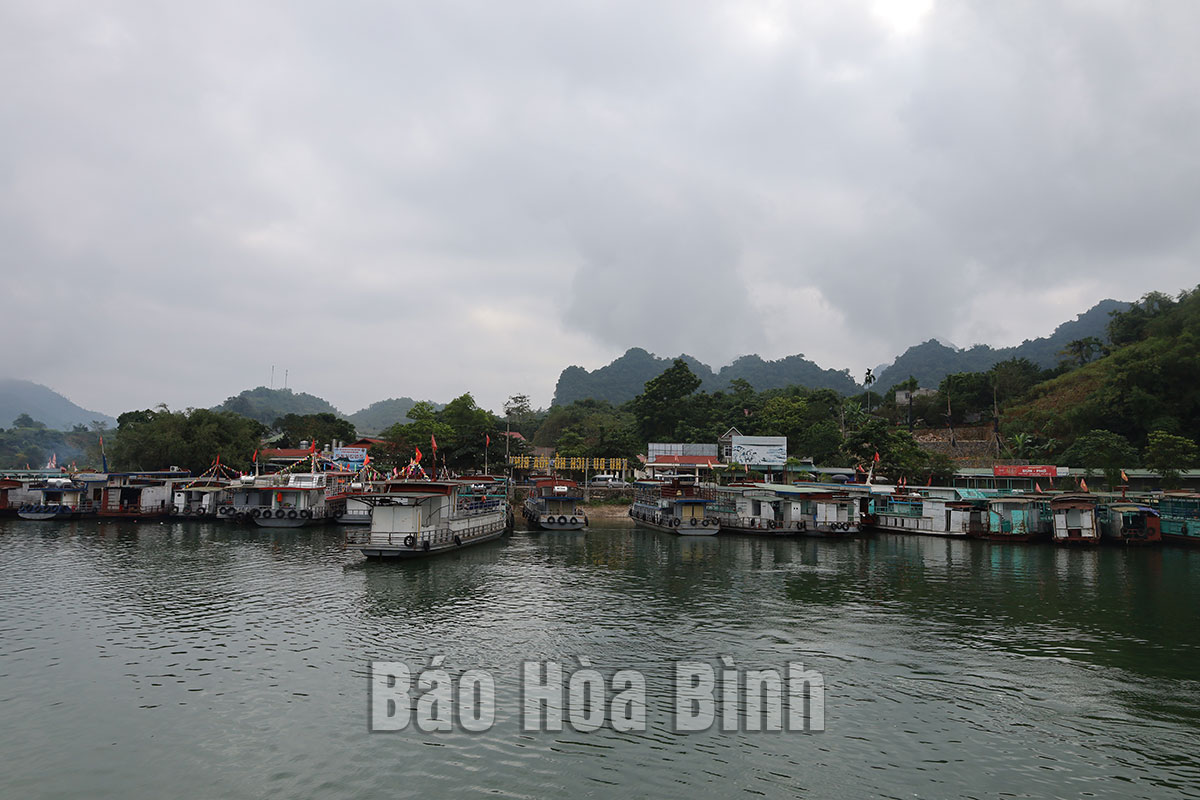
(HBO) – Thung Nai in Hoa Binh’s Cao Phong district used to be a disadvantaged commune but it has made strides in tourism development and become more popular thanks to captalising on its location of being in the reservoir area.

Thung Nai wharf in Thung Nai commune (Cao Phong district) – the starting
point of a trip to explore Hoa Binh reservoir.
Thanks to a close proximity to the capital city of Hanoi, visitors can travel
to the Thung Nai tourism site by various means of transport, including
motorbikes, coaches or self-driving cars.
The road linking Hoa Binh city with Thung Nai wharf has been upgraded with
qualified infrastructure, creating optimal conditions for visitors to explore
each location of the tourist site by boat.
Head of the Cao Phong district’s culture-information office Pham Ngoc Nhat said
that the Thung Nai tourist site is located on a favourable area in the Hoa Binh
reservoir and home to numerous spots like Thac Bo temple, Trach stream and Thac
Bo float market.
It is also close to a community-based tourism site in Suoi Hoa commune (Tan Lac
district). In addition, tourists are advised to visit nearby Thac Bo temple
with marvelous and mystical beauty.
Another outstanding location in the Thung Nai trip is Trach stream. It is
compared to a natural fascinating pool with cool fresh water flowing through
the rocks. To reach the stream from Thung Nai wharf, visitors travel for about
20 minutes by boat and then walk for some 1 km from Da River’s bank until they
can hear the sound of the stream.
If coming to Thung Nai on Sunday, travellers will have a chance to explore Thac
Bo float market. Trading activities is bustling here, with the most-traded
items being Hoa Binh reservoir’s specialties of fish, shrimp, and dried bamboo
shoots. Many chose to book their trip on weekends to leisurely select products
at the floating market.
In addition to locations for sight-seeing, Thung Nai is suitable for camping
and team building activities.
Visitors should try canoeing to enjoy the feeling of floating on water surface.
They also are impressed by delicious dishes, fresh food and overnight stay at
inns on the reservoir.
Two highly-rated inns are Coi xay gio (The Windmill) and Dao Dua (Coconut
Island). The first one is built based on European style with reasonable costs
and nice view and is suitable for couples and families going on vacation.
Meanwhile, Dao Dua inn has an eco-friendly vibe, offering various services for
families and groups of friends who favour activities and exploration./.
Spanning thousands of hectares and winding gracefully along mountain slopes, hillsides, and riverbanks, the terraced rice fields of Lac Son District present a stunning and captivating beauty. This region, renowned for its remarkable terraced landscapes, is also the centre of Hoa Binh Culture known for numerous archaeological sites.
The life of Mong people in Hang Kia and Pa Co communes of Mai Chau district has improved much thanks to tourism development.
The man-made Hoa Binh Lake, with a water surface area of approximately 9,000 hectares and a capacity of 9.45 billion cubic meters, stretches over 200 kilometers from Hoa Binh to Son La provinces. With the goal of developing into a national tourism area, the Hoa Binh Lake tourism area is expected to not only become the largest tourism centre in the province but also one of the 12 key tourist destinations in the northern midland and mountainous region of Vietnam.
Da Bia hamlet, now Duc Phong, in Tien Phong commune, Da Bac district, was once almost isolated from the outside as the only way to the hamlet was to get a boat ride across the Hoa Binh reservoir. However, as its tourism potential has been unleashed, the hamlet has established itself as one of the most attractive destinations on the tourism map. It has even received the ASEAN Community-Based Tourism Awards in 2019.
In the first 9 months of 2024, Mai Chau district, Hoa Binh province welcomed over 684 thousand visitors to visit and relax. In which, over 516 thousand domestic visitors and more than 168 thousand international visitors. Total revenue from tourism is estimated at over 821 billion VND.
Da Bac district, bestowed with stunning landscapes, is developing ecological and resort tourism offerings. Several tourist sites, put into operation this year, has attracted throngs of high-spending and young domestic visitors.



